Enterprise Singapore developing new local, international sustainability standards and accreditation schemes
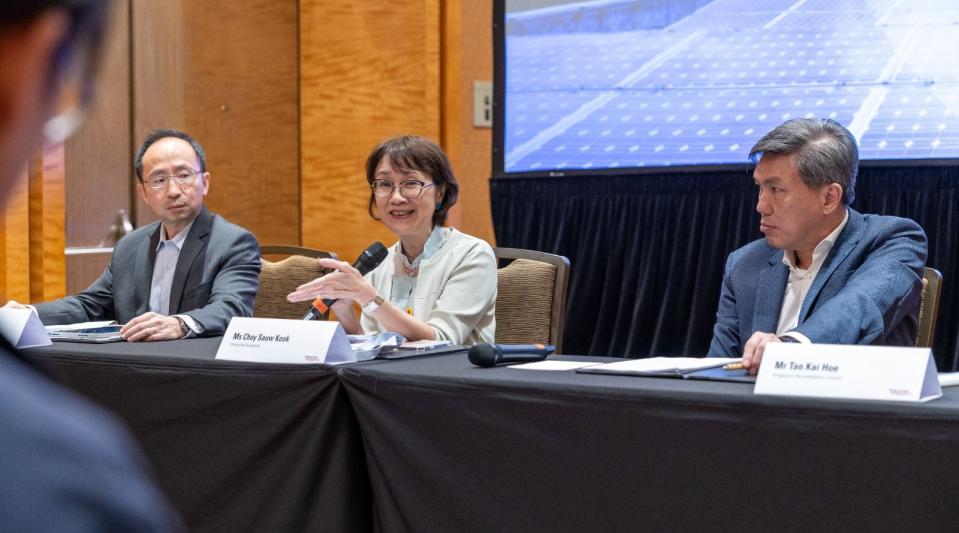
Among the earliest standards to be adopted here is a new standard on electrical energy storage systems, targeted for mid-2024.
Singapore businesses can look forward to new standards and accreditation programmes in greenhouse gas reporting, decarbonisation and renewable energy, with Enterprise Singapore (EnterpriseSG) set to introduce and revise these schemes over the next two to three years.
This will support businesses in the transition towards more sustainable practices and help them access new opportunities in the green economy, says the statutory board under the Ministry of Trade and Industry.
EnterpriseSG announced the plans at its biennial Quality and Standards Conference 2023 on Sept 29, saying it will work with the Singapore Standards Council (SSC) and Singapore Accreditation Council (SAC) on the coming changes.
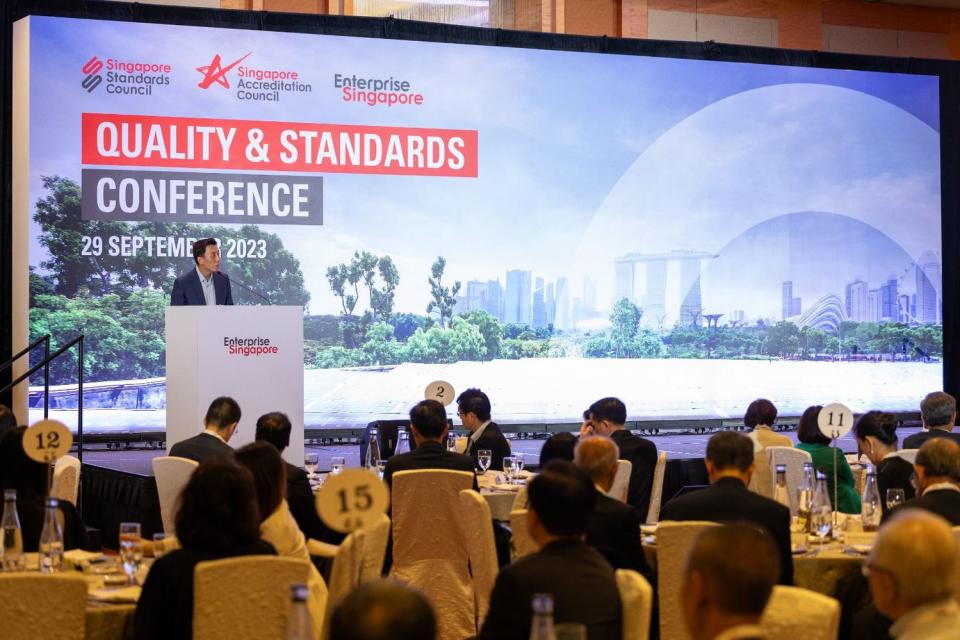
At the international level, EnterpriseSG and SSC are leading the development of an International Electrotechnical Commission (IEC) standard on the design guidelines and recommendations for floating photovoltaic (PV) power plants.
Expected to be available by end-2024, the new IEC standard will reference Singapore’s Technical Reference (TR) 100, which sets out general guidelines and recommendations for the design and installation of floating photovoltaic (PV) power plants.
According to EnterpriseSG, Singapore is also active in developing sustainability standards across 27 international technical committees at the International Organisation of Standardisation (ISO) and IEC, up from 18 in 2019.
These technical committees oversee standards development in multiple areas of sustainability, including energy efficiency, energy management systems and greenhouse gas management.
Upcoming international standards that are being developed with Singapore’s participation include new ISO standards to guide companies on greenhouse gas emissions reporting and a new framework to establish carbon neutrality and greenhouse gas reduction strategies.
To enhance companies’ access to opportunities in the green economy overseas, SAC plans to expand Singapore’s international mutual recognition arrangements (MRAs) in areas such as greenhouse gas validation and verification for the International Civil Aviation Organisation — Carbon Offsetting and Reduction Scheme for International Aviation (ICAO CORSIA) by end-2023.
MRAs are agreements between accreditation bodies from different economies to mutually recognise reports and certificates issued by one another. This ensures consistency and robust practices, says EnterpriseSG, and reduces barriers to trade as it allows goods and services to move freely across borders without the need for further testing, inspection or certification by the importing country.
The network of MRAs established by SAC today provides Singapore companies with easier market access when they export their products and services to over 100 economies, including China, India, Indonesia and the US.
Upcoming local standards
Locally, EnterpriseSG will work with SSC and SAC to introduce and revise more than 25 sustainability-related national standards and accreditation programmes over the next two years.
These span standards targeted to accelerate decarbonisation efforts in the energy and maritime sectors, and sector-agnostic standards to help enterprises improve their environmental performance in carbon emissions, energy, water efficiency and material management.
Since the launch of the SG Green Plan 2030 in February 2021, Singapore has developed 35 new sustainability-related standards and accreditation programmes, numbering 108 to date.
To date, more than 50 SAC-accredited testing, inspection and certification companies in Singapore have issued over 1,000 accredited certificates here.
Choy Sauw Kook, director-general (quality and excellence) at EnterpriseSG, says it is essential for companies to adopt standards and use accredited testing, inspection and certification services to strengthen sustainability practices, “which builds trust and confidence in Singapore’s products and services”.
The local standards and accreditation programmes are expected to benefit more than 1,000 companies, adds Choy.
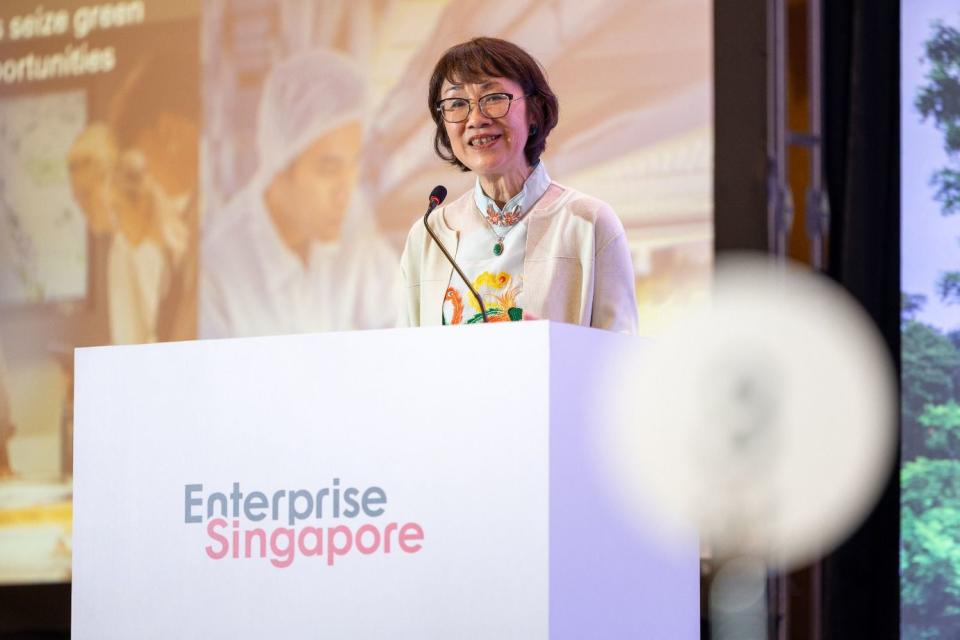
Among the earliest standards to be adopted here is a new IEC standard on electrical energy storage (EES) systems, which supports the integration of power-intensive and renewable energy sources. This standard is targeted for completion by mid-2024.
The standard provides requirements on grid integration, performance indicators, monitoring and maintenance of EES systems, which can help businesses optimise the storage of power intensive energy sources and integrate renewable energy sources such as solar power into the grid.
Looking ahead, standards planned for 2025 include rules on charging stations for electric harbourcraft, methanol and ammonia bunkering and hydrogen refuelling.
To help defray costs associated with transiting to more sustainable practices, EnterpriseSG has been supporting companies with the adoption of sustainability-related standards under the Enterprise Sustainability Programme (ESP).
At the launch of ESP in October 2021, EnterpriseSG said it had set aside up to $180 million for the programme, which would support “training workshops, capability and product development projects, and key enablers such as certification and financing”. EnterpriseSG also forecast that 6,000 enterprises “from a variety of sectors” would benefit in the four subsequent years.
Today, EnterpriseSG says it has supported more than 70 companies in adopting sustainability-related standards through the ESP, and has supported some 700 companies in various aspects, such as via the Enterprise Development Grant and the Enterprise Financing Scheme.
A spokesperson for EnterpriseSG says the agency is still on track to help 6,000 enterprises by 2025.
‘No requests’ yet for nuclear, biodiversity issues
The work around standards-setting only begins after a number of considerations have been met. In a Sept 29 media briefing, EnterpriseSG’s Choy describes the process of developing new standards.
“Whenever we look at requests from the industry, or looking at national priorities, we always ask ourselves whether standards are the solution. If standards are the solution, is there any international work that’s happening in that space or at the national level in another country? If so, can we adopt [it], or can we participate in [its] development? If there aren't any, especially in emerging areas or areas where Singapore has strategic interest in, then we will look into the development.”
For these reasons, the agencies have opted not to duplicate work around carbon credit verification, says Choy, despite the fragmented nature of the sector.
In addition, Choy says the relevant agencies have not received requests for standards around small-scale nuclear power for the maritime industry and nature-related disclosures by corporates.
Choy emphasises a “multi-stakeholder approach” to developing standards. “We look at industry representation, we look at academia and we look at government agencies; and all these partners come together at the table to discuss, [and] define the scope and then write the standards.”
Tay Jih-Hsin, chairman of the SSC, says standards continue to play an integral role in enabling enterprises to build new sustainability capabilities. “The SSC will continue to work in developing standards that support enterprises on their sustainability journey. We will also expand our active participation in international standards committees such as the ISO and IEC to raise the profile of Singapore’s sustainability push and connect local companies to more overseas stakeholders.”
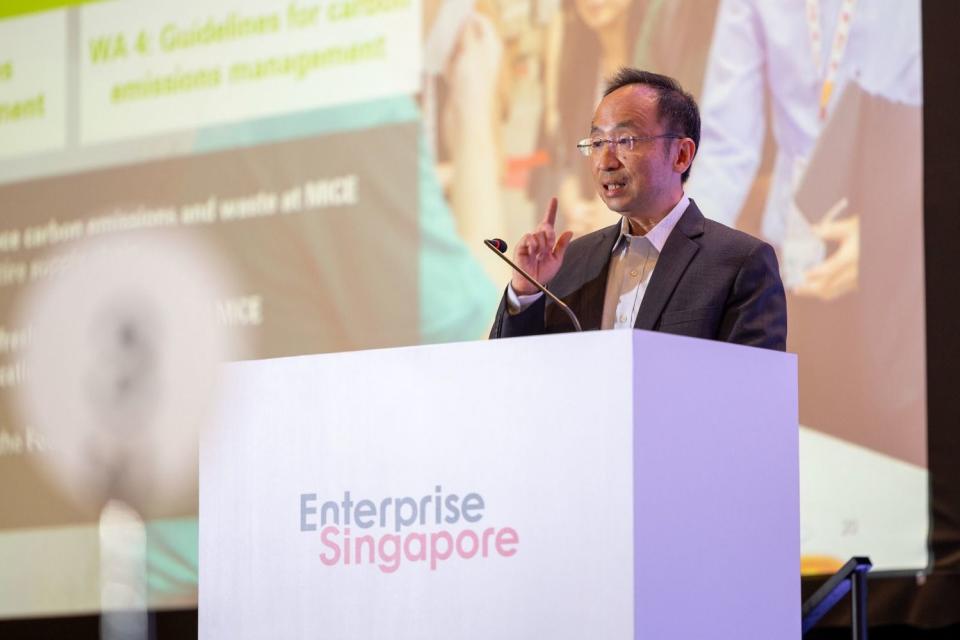
Tan Kai Hoe, chairman of the SAC, says it is essential for companies to continue differentiating themselves to stay competitive. “As the national accreditation body, SAC plays an important role in building Singapore’s quality and assurance infrastructure to enable robust and consistent adoption of sustainability practices and provide enterprises with the necessary platform to gain a competitive advantage. We continue to pursue initiatives and programmes in existing and emerging sustainability areas, and develop competent testing, inspection and certification players to support the growth of our local businesses.”
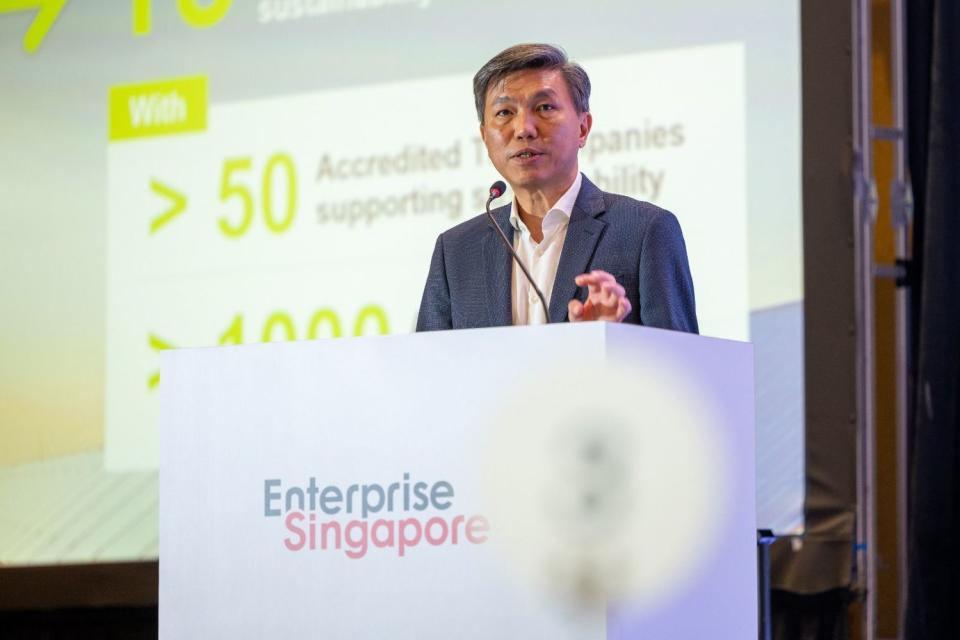
That said, Tan cautions that standards are not a silver bullet for all corporate issues. “Although this is a standards and accreditation platform, standards are not the solution to everything. [We’re] not trying to make it that way. [For] some things, standards are the best solution, having a standard is best; [but] some things are actually quite complex and you have to look at other ways of solving the problem. So, we’re not trying to force standards into every single solutioning process.”
Photos: Enterprise Singapore
See Also:
Click here to stay updated with the Latest Business & Investment News in Singapore
Get in-depth insights from our expert contributors, and dive into financial and economic trends

 Yahoo Finance
Yahoo Finance 